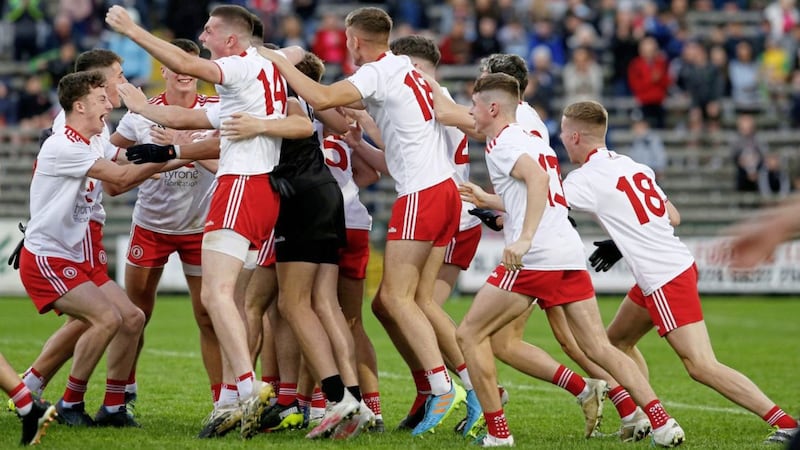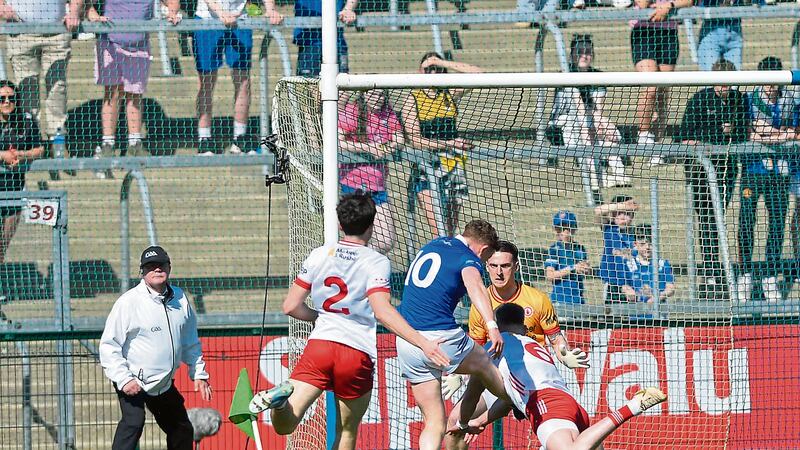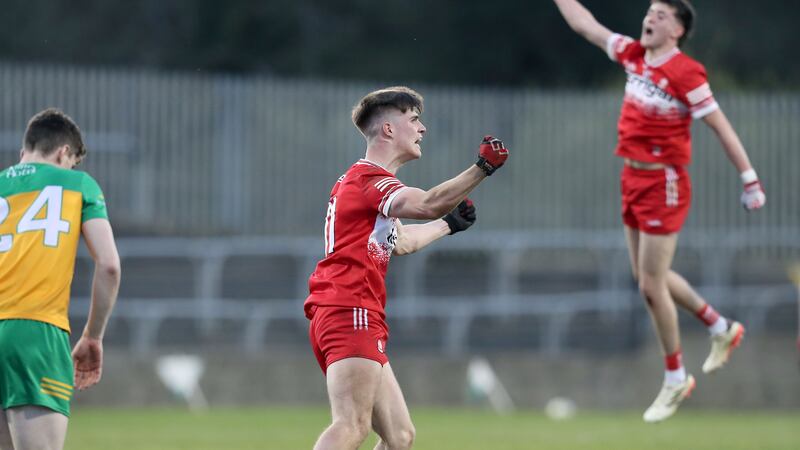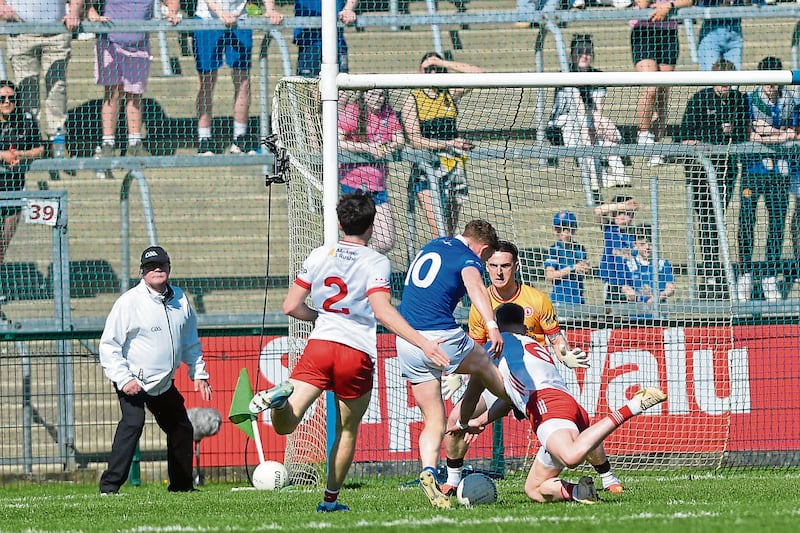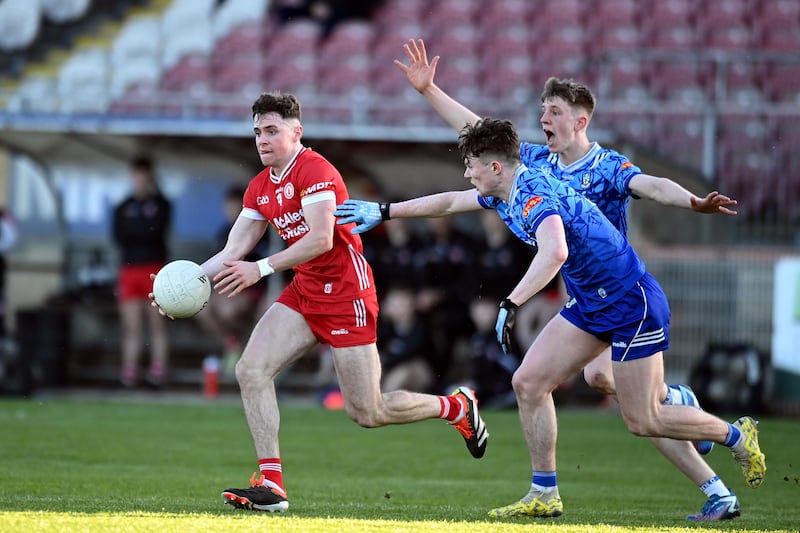MOST lads and lasses would hop on their bikes in the unlikely event that mum or dad isn’t prepared to take them to play for the U14 Academy team. But let’s get real, if our Dara or our Tara is playing for the county, parents, grandparents, brothers, sisters, aunties, uncles and cousins would be in the stand roaring them on.
The chance to represent our county, at whatever level, is the ultimate honour and, at their best, academy systems improve standards across the board by giving talented youngsters the opportunity to improve with and against other gifted kids and benefit from expert coaching.
Ultimately, the primary aim should be that they’ll go back to their clubs as better players and that they’ll raise the bar when they do so.
Of course the inevitable downside is that many players can fall by the wayside when large training squads are cut to league and championship panels and that culling process has to be handled with sensitivity and care.
Too often that isn’t the case.
I had an email recently from a parent who’d been dismayed at how young players were scooped up by academy coaches and then dumped unsympathetically when they were deemed not up to be at the required standard.
“In other county’s once a player is dropped they are given regimes to follow and told what they need to improve on and also that the county set-up will be keeping a look out as to how they are progressing,” wrote the parent.
“In our county they were forgotten about. My son found out that he was no longer on a panel when his name didn't appear on the squad list for a game.
“He was on the U20 squad and was told at the outset by the managers that no one would be dropped off the squad without being told either face-to-face or by phone as to why they were being dropped.”
Three years’ later the lad is still waiting on that call.
His dad added that, in his opinion, Tyrone are the benchmark for how young players are treated and perhaps that explains in part why the Red Hand county has enjoyed such success at underage level in Ulster over the past three seasons.
The Tyrone minors were unlucky to lose this year’s All-Ireland final and the county were provincial champions at U20 level in 2018 and 2019.
In 2014 Tyrone rebranded their underage teams as academies and, from the outset, players were told in no uncertain terms that, first and foremost, they were club players.
“They were coming to Garvaghey and getting extra expert coaching and advice but they didn’t get a Tyrone jersey,” explained a source in the county.
“We didn’t want the old story of the lad going back to training with his club thinking he is ‘all that’.
“We took that away so they trained in club gear and went to matches in club gear. It made players more aware that you have to earn the right to earn county football. You don’t want anyone thinking that because they’re in the squad at U14 they’re on the pathway and it’s free-wheeling the whole way up because there are examples of players in Tyrone and every county who don’t progress after they hit a certain age.”
Paudie Hampsey, the man who lifted the Sam Maguire last month, didn’t make Tyrone’s 2011 minor team and neither did fellow All-Ireland winners Kieran McGeary or Mark Bradley but they stuck at it. Meanwhile some of those who did make it aren’t even playing club football now.
A couple of years ago, some senior Tyrone players attended an underage session and related their experiences to the young hopefuls.
“Your talent has got you here,” one explained: “But it’s your character that will take you further.”
Young players have to be thick-skinned and fully-committed to make the grade. Counties can carry up to 80 players at U15 level but by U16 the number is cut to 35-40 and so it’s up to a (volunteer) manager to go back to 40 disappointed players, explain his reasons and give each one what has been termed an ‘exit strategy’.
Even in Tyrone, that doesn’t always happen.
“In a professional environment it’s a lot easier,” explained the Tyrone source.
“In a lot of county underage set-ups it comes down to manpower and sometimes the exit strategy is: ‘Sorry, you just didn’t make it’ and sometimes it’s a list of names on the wall or on the website.”
In an effort to address that situation, Tyrone decided to assemble underage squads from players who had impressed at secondary school level. That strategy avoids the scenario were clubs nominated players who didn’t have the tools to make the grade.
Four Tyrone schools compete in the MacRory Cup and others including Dean Maguirc College, St Patrick’s, Dungannon and St Joseph’s, Coalisland are natural football academies.
“We found that clubs sent players to trials just for the sake of sending them and they didn’t realise they were doing damage to the players by doing that,” said the Tyrone source.
“They were sending a lad up who was way out of his depth and getting embarrassed in front of other lads they might go to school with. It set them back.
“So we went through the schools and then put out a list of names who were invited and then if a lad was playing well for their club but hadn’t been nominated at school, the club manager was contacted and the player was invited in. If he was able to hold his own, brilliant, if not he was told: ‘Look we want you to work on X, Y and Z and we’ll keep an eye on you’. But it’s hard to keep track on the amount of players who come in and out of the system.”
These days Tyrone focus primarily on club fixtures below U17 level but my friend is convinced that academy systems are doing a valuable job.
“Academies raise the standard of club football,” he said.
“They bring players in for an extra session every week where they will learn something new that they can bring back to their club and then players at the club will push that bit harder around them.”
With no guarantees of success, perhaps the key for young players and their parents is to enjoy the moment and keep feet on the ground and expectations realistic.
But county boards, managers and mentors have a vital role to play in the well-being and development of the kids who don’t make it which is too often forgotten. Handle with care.
